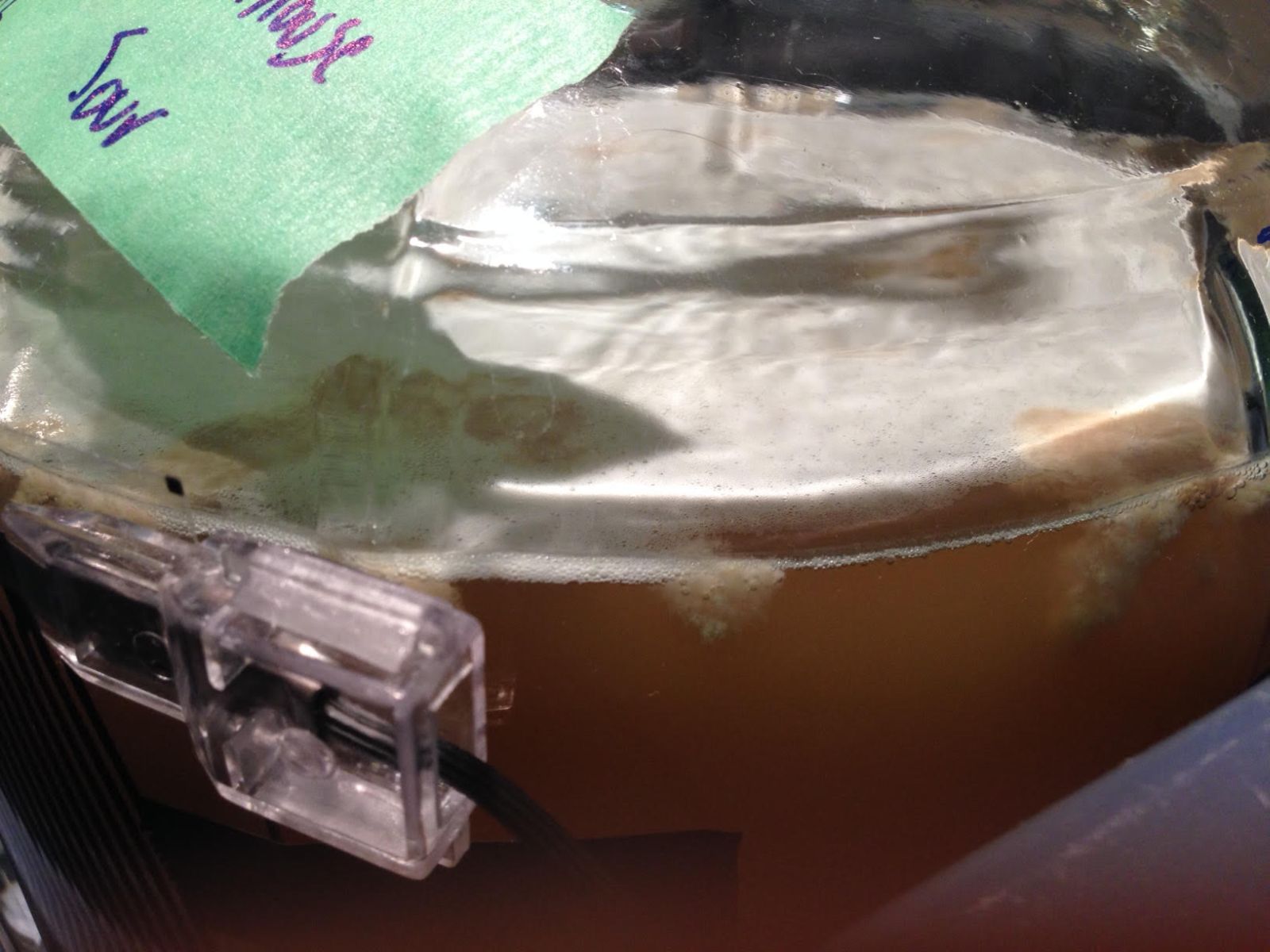My brew day was split into two batches. I won't get into the details, but in summary I ended up with 2.75gal of 1.042 wort at 6IBU (pitched farmhouse sour) and 2.75gal of 1.043 wort at 18IBU (pitched saison/brett blend + dregs from Wicked Weed Serenity). My grain bill was the Rare Barrel golden sour recipe (70% pils, 18% wheat, 6% oats, 6% aromatic). Mash temp of 156-157F, shooting for 158F.
I tasted these at the end of primary fermentation, or what I viewed as the end of the saccharomyces fermentation at 10 days. Each krausen looked quite different but seemed to take the same amount of time. Details and tasting notes below.
10 days - Farmhouse sour: 1.007
-Appearance: Pale, turbid, lots of CO2 in suspension. Aroma: slightly tart, bready(like bread yeast), orange. Taste: slightly tart, a bit flat or one-dimensional.
- Saison/Brett blend: 1.008
- Appearance: Golden, slightly cloudy. Aroma: orange, bread, earthy. Taste: orange, tart, and slightly bitter.
- Temperature reduced to 65F over the period of ~1 week
February 19
- Farmhouse Sour: Appearance same. moderate CO2 in solution. Aroma: Strong bready, orange/citrus. Taste: tart, bright. Mouthfeel is thin. SG: 1.002/3. Still a little one dimensional.
- Saison/Brett: Appearance: Slight haze, whisper thin pellicle on surface, white, no bubbles. Quite a lot of CO2 in solution. Aroma: earthy, hay, bread, slight rubbery. Taste: lemon, quite tart, some mouthfeel remaining. SG: 1.007
It may be the recipe design, but at the end of the saccharomyces fermentation, I didn't get a lot of saison character in either beer. In my experience, by 10 days into fermentation, you can really start to tell the character of the beer. Unfortunately it just wasn't there at that time. My goal was to make a tart saison, time will tell if this comes out in the end.
I was a little surprised to see that the lacto had blown through all the food so fast, but hadn't produced a lot of tartness. Depending on what I find when I taste this again, I'm tempted to add some unfermented wort, and possibly another healthy dose of lactobacillus. My mash temp could have been a little higher, but 2F wouldn't have made a huge difference, I don't feel. Next time maybe I could add some more unfermentables in the recipe.
The saison brett blend was surprisingly nice in such a short amount of time, I felt. I was also surprised to see that there was so much gravity remaining (in comparison to the other). I hadn't expected so much sourness from this beer (I thought that the lacto blend would have produced more acidity). I suppose I ruined the experiment by adding another variable (bottle dregs), but I'm excited to see what this turns into.
Both are in my basement (probably 56-58F), will probably get up to 60-62F in a few months. There is currently a very thin, broken pellicle on the brett blend (didn't really reform after sampling, plus I had to move these), nothing on the lacto blend.
I'd be happy to hear suggestions about what to do with the lacto beer that has very few fermentables remaining.




























![Craft A Brew - Safale BE-256 Yeast - Fermentis - Belgian Ale Dry Yeast - For Belgian & Strong Ales - Ingredients for Home Brewing - Beer Making Supplies - [3 Pack]](https://m.media-amazon.com/images/I/51bcKEwQmWL._SL500_.jpg)





























